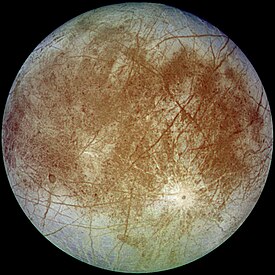Enceladus may have Earth-like plate-tectonics.
 NASA scientists working with the Cassini spacecraft have found that Saturn's moon Enceladus has very Earth-like plate tectonics. The snow-white satellite has many fractures ear its south pole and now it's been confirmed that some sections of them are moving, much as Earth's crust fractures do in the ocean or in East Africa (the Rift valley). The difference may be that, while in Earth the engine is driven by molten lava, in Enceladus it may be water what pushes the icy surface around.
NASA scientists working with the Cassini spacecraft have found that Saturn's moon Enceladus has very Earth-like plate tectonics. The snow-white satellite has many fractures ear its south pole and now it's been confirmed that some sections of them are moving, much as Earth's crust fractures do in the ocean or in East Africa (the Rift valley). The difference may be that, while in Earth the engine is driven by molten lava, in Enceladus it may be water what pushes the icy surface around. Source: BBC.
Titan's frost volcanoes.
 Another info brought by Cassini: it seems that the hazy orange moon of Saturn, Titan, may have cryovolcanoes, that is: volcanoes that erupt with cold materials like ice water, amonia and methane.
Another info brought by Cassini: it seems that the hazy orange moon of Saturn, Titan, may have cryovolcanoes, that is: volcanoes that erupt with cold materials like ice water, amonia and methane.Source: SD.
Axial tilt heats Europa's interior ocean.
 According to Robert Tyler, from the University of Washington, the axial tilt of Europe (still not well known) should be eanough to cause heating and, therefore, strong currents, in the ocean that Jupiter's satellite is thought to have under its crust. This model should also affect other solar system bodies with underground oceans.
According to Robert Tyler, from the University of Washington, the axial tilt of Europe (still not well known) should be eanough to cause heating and, therefore, strong currents, in the ocean that Jupiter's satellite is thought to have under its crust. This model should also affect other solar system bodies with underground oceans. Source: SD.










